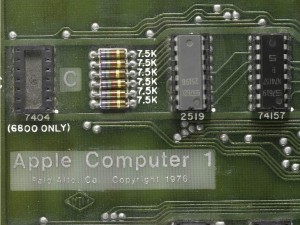Small Yet Global: The New Industrial Revolution in America
Twenty years ago, a small, mom-and-pop, business could easily be outcompeted by a large multi-national corporation. Some argue that that’s still true today, though it’s much less certain thanks in large part to technology. Yes, technology, and it’s not just some vague notion of “the Internet” either.

The Apple Computer changed technology forever, photo Apple Computer 1 for sale Sotheby’s
The Personal Computer Revolution
In the early days of computing, IBM was the leader. But, when a young man from Stanford decided he’d reinvent the computer, a revolution was born. Steve Jobs, Steve Wozniak, and their team of computer nerds created Apple, and a line of Macintosh computers that ended up transforming the world. Sure, Microsoft was making software at that time, but they were also selling a lot of Apple’s software.
In fact, at one point, Bill Gates’ company made nearly half of its revenues from Apple’s product line. Pretty incredible, right? When the personal computer became affordable enough for everyone to own, more and more people started to buy it. Suddenly, it was no longer a hobby. It was a personal productivity tool. School papers were being written on it. People were using it to make posters, newsletter, and do spreadsheets and analysis.
Yes, It’s Also The Internet
When the Internet (and access to it) became more widespread, companies like It Straps On, Inc could finally have a voice among other large steel producers and manufacturing plants. The Internet is the great equalizer, making mom-and-pop shops larger than they really are.

Public domain photo/ Bergsten
It helped to push niche industries and businesses to the forefront. All of the sudden, General Mills, and Tyco weren’t the only kids on the block. Small companies could reach out, be found, and yet still remain “local” and small.
The Internet also did something that, until that point, had never been done – it brought people together, creating communities in a virtual reality. At first, the web was populated with usenet groups. But, as time went on, the web became more and more a place to conduct business. It was like having a neighbourhood shop right near you, even when they were hundreds of miles away.
A one-man operation could now run his business like he was a multinational corporation. Outsourcing became easier, freelancing became a viable full-time position and was streamlined through online marketplaces – concentrating contractors – and POS terminals were slowly replaced by online ecommerce solutions.
3D Printing
The newest technological advance puts manufacturing – long considered an important cornerstone of the U.S. economy – in the hands of practically anyone. It’s been called the 3D printing or manufacturing revolution. Basically, printers that are capable of printing anything, from shirts to automobile parts and even firearms and possibly food (in the future) will change how manufacturing is done.
Outsourcing to countries like China and India may become a thing of the past as manufacturing costs plummet to zero, machines take over former human-labor jobs, and manufacturing returns home.
Labor is notoriously expensive in western countries, which is why it’s often outsourced to poor countries – the standard and cost of living is very low in Vietnam, for example.
Yet, with 3D printing, even third-world countries won’t be able to compete.
The Future
The future definitely looks bright for manufacturing. As 3D printing improves, prices for printers will drop, more companies will replace current machines for automated printers, and manual labor will shrink. But, this will be an opportunity for those newly unemployed, not a death sentence. Sure, new educational initiatives will need to take place but, in the end, everyone will be better off.
Manufacturing will be decentralized, consumer choice will drive markets, and it will be the greatest revolution since the invention of the printing press, and for the same reasons.
Guest Author
Brett Ellison is passionate about the economy. He uses his years of experience studying economic health to write about current changes and trends across industries.














